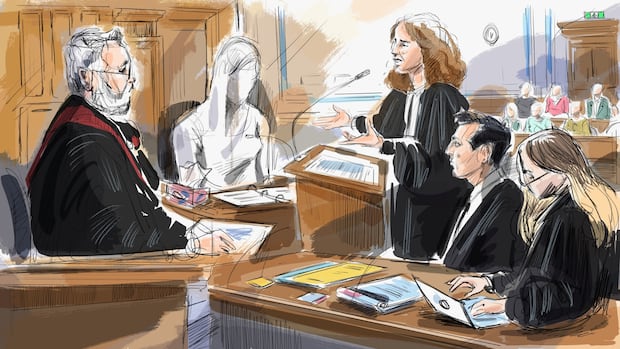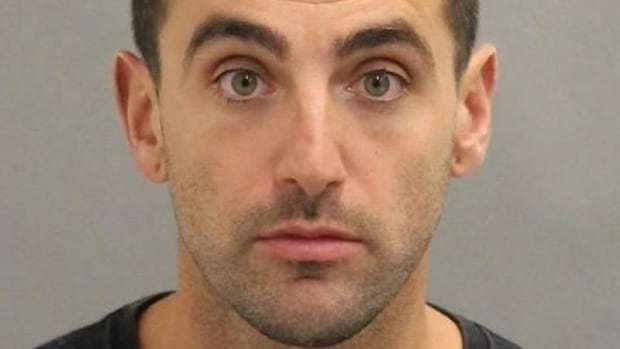
WARNING: This article may affect those who have experienced sexual violence or know someone affected by it.
More than two years after he was convicted for a violent rape, Jacob Hoggard is waiting to find out whether a jury will find him guilty of sexually assaulting another woman.
With jurors sequestered since Friday afternoon to deliberate on a verdict, it can now be reported that prosecutors and the defence agreed to avoid any reference to Hoggard’s conviction in 2022 or any “prior discreditable conduct” during this trial in northeastern Ontario.
And although the disgraced 40-year-old singer is now serving a prison sentence, the court took steps to ensure jurors didn’t see any sign that he’s currently in custody.
This is all common practice in such circumstances, legal experts say, to ensure the jury focuses solely on the evidence presented at trial.
The former frontman of the Canadian pop-rock group Hedley pleaded not guilty last week to one count of sexual assault, stemming from an incident inside a Kirkland Lake, Ont., motel room in June 2016.
A woman who was then 19 alleges Hoggard raped her after she attended the band’s concert and an outdoor after-party. The complainant’s identity is covered by a publication ban.
The allegations bear striking similarities to Hoggard’s encounter with an Ottawa woman five months later in a Toronto hotel room.
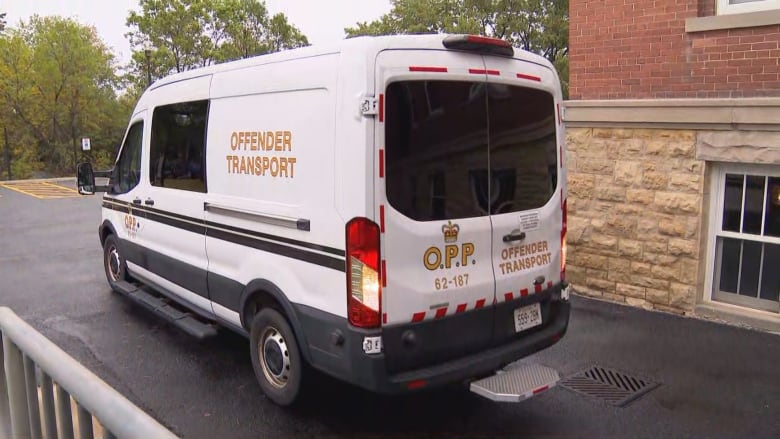
In both cases, each complainant said Hoggard choked and raped her, calling her a pig.
The November 2016 incident led a jury to find Hoggard guilty of sexual assault causing bodily harm. The trial judge sentenced him to five years, describing the attack as “a manipulative and particularly degrading rape.”
At the same trial in June 2022, the Toronto jury acquitted Hoggard of two charges involving a teenager: sexual assault causing bodily harm and sexual interference, an offence that refers to touching someone under 16.
Hoggard’s defence team is seeking leave to appeal his previous conviction to the Supreme Court of Canada. They requested he be released on bail in the interim.
Last month, an Ontario appeal court judge denied him bail, writing that the country’s top court is “unlikely” to hear Hoggard’s case.
‘Too traumatic’ to read about other accusers: complainant
At Hoggard’s trial this year, which started last week, the complainant brought proceedings to an abrupt halt when she made reference to Hoggard’s other accusers.
“I did not research the case,” the now 27-year-old complainant testified, as she fought back tears. “It was too difficult for me to read the stories of other women.”
Hoggard’s lawyer Megan Savard quickly told the judge she needed to make a submission to the court, which required the jury to leave the room.
“Prior discreditable conduct is the kind of evidence which, if leaked before a jury, could give rise to a mistrial,” Savard told Superior Court Justice Robin Tremblay.
Savard said she and Crown attorney Peter Keen “agreed it should not be part of this trial.”
The complainant’s brief reference to Hoggard’s other accusers came on her fourth day of often tense cross-examination by Savard. The defence was seeking to illustrate to the jury that the woman filled in gaps in her memory by doing research online.
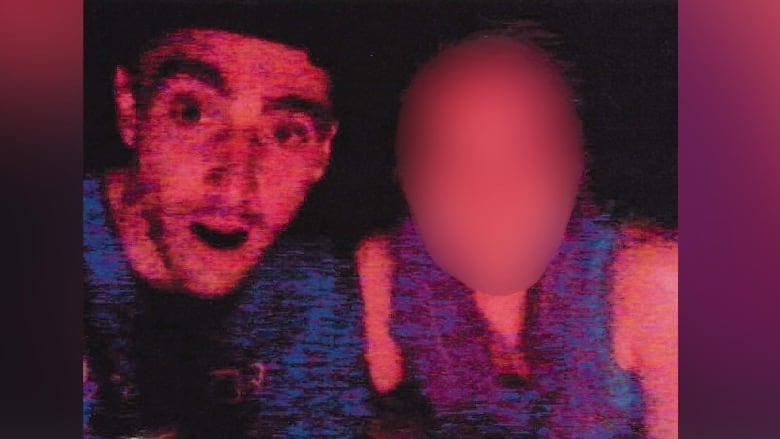
The complainant acknowledged she looked up certain aspects of her story, such as details about the motel and the van that picked her up from the concert venue. But not about Hoggard’s other accusers.
“It was too traumatic for me,” the complainant insisted. “I did not research any news, anything about the cases.”
Regarding previous accusers, she testified she was “told through CBC what had happened.” (The woman spoke to a CBC News reporter in 2022 about the encounter at the Kirkland Lake Comfort Inn, after she filed a formal police complaint.)
The judge later instructed the jury to disregard the “stories” the complainant said she had heard. “It’s not admissible evidence,” Tremblay told jurors.
Tonya Kent, a Toronto-based criminal defence lawyer who’s not involved in the Hoggard case, explained that it’s standard for a jury to be shielded from knowledge about an accused person’s previous trial.
“Jurors might not assess the evidence that’s before them and instead say, ‘He did this before, so likely he did it now’ and start using the previous conviction to say, ‘He must have done it,'” Kent said in an interview.
The jury was not told that every morning during this trial, Hoggard has been transported from a jail in North Bay, Ont., and driven 150 kilometres north to the Haileybury courthouse, in the city of Temiskaming Shores, Ont.
Last week, officers shielded Hoggard from view as a CBC videographer sought to record him being led out of an offender transport van and into the courthouse.
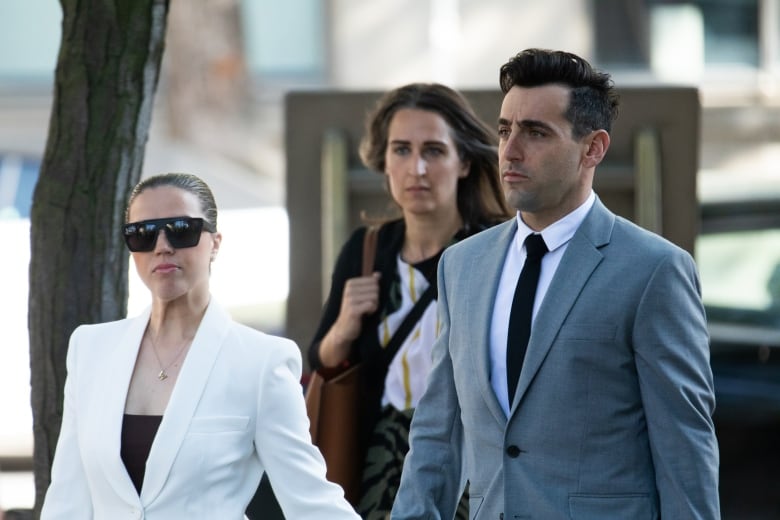
For this trial, the jury has only seen Hoggard wearing a dark suit and tie, seated with his lawyers or testifying from the witness box. During her cross-examination of the complainant, Savard also made a point of saying the accused’s wife, identified in court document as Rebekah Hoggard, was in the public seating area. She is also known as Rebekah Asselstine.
Defence dismisses June 2016 incident as a ‘sleepover’
The defence has sought to portray the June 2016 episode in Kirkland Lake as a consensual “sleepover.” During cross-examination, Savard suggested the complainant, now 27, had secretly wanted a one-night stand with a famous musician.
But the woman strenuously denied the claim. She told court she was left terrified as Hoggard penetrated her on the motel bed.
“I didn’t consent to that,” she tearfully recounted last week, as Hoggard sat silently in the courtroom. She testified he later urinated on her.
Days later, Hoggard testified in his own defence, describing the episode in starkly different terms.
“She was as into it as I was,” Hoggard said. He denied using violence and said he had a “very, very clear memory” that it was in fact the complainant who urinated on his face, at his request.
In 2018, Hoggard acknowledged on social media that for more than a decade, he “behaved in a way that objectified women” and said his actions were “reckless and dismissive of their feelings.” But he insisted he never engaged in non-consensual sex.
At his previous trial, court heard Hoggard had some 200 sexual partners in his life, with 60 to 70 per cent of them being fans.
The defence continued its aggressive cross-examination of the woman accusing musician Jacob Hoggard of rape. The complainant broke down as Hoggard’s lawyer challenged her memory of events and suggested the encounter was consensual.
At sentencing in October 2022, Ontario Superior Court Justice Gillian Roberts raised the prospect that Hoggard could reoffend.
“I agree with the Crown that we cannot say that Mr. Hoggard will never again find himself in a situation where he has a sexual opportunity, wants to validate himself and impulse takes over,” Roberts said.
For anyone who has been sexually assaulted, there is support available through crisis lines and local support services via the Ending Violence Association of Canada database. If you’re in immediate danger or fear for your safety or that of others around you, please call 911.
